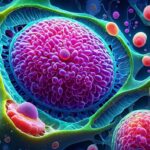Discover the surprising fun fact about protein that could unlock the key to a healthy lifestyle. As we delve into the captivating world of nutrition, we uncover the remarkable benefits of this essential macronutrient. From supporting muscle growth to promoting weight loss, protein plays a crucial role in our overall well-being. Join us as we explore the exciting realm of protein and its unexpected advantages, shedding light on how it can contribute to a balanced and thriving life.

Key Takeaways:
- Protein is an essential component in every cell of the human body and makes up approximately 20% of our body weight.
- Proteins play crucial roles in growth, repair, and maintenance of tissues, as well as in bodily functions like digestion, immunity, and nutrient transportation.
- There are 22 amino acids in proteins, including nine essential amino acids that we need to obtain through our diet.
- Each gram of protein provides 4 calories, and unlike carbohydrates and fats, the body cannot store protein.
- The human body contains around 100,000 different proteins, formed by unique combinations of the 20 amino acids.
- Proteins are involved in cell division, growth, reproduction, and healing.
- Approximately 18-20% of our body weight is made up of proteins.
- Regular intake of protein is necessary as the body cannot produce all the necessary amino acids.
Fun Fact about Protein: Unlocking the Secrets to a Vibrant Life
Protein, oh protein! This fascinating nutrient is an absolute powerhouse when it comes to maintaining a healthy and balanced lifestyle. Did you know that protein is an essential component in every cell of the human body, making up approximately 20% of our body weight? It’s true! Without protein, our bodies simply wouldn’t function properly. So, let’s dive into the wonderful world of protein and uncover some surprising fun facts that’ll leave you amazed.
Proteins: The Building Blocks of Life
Proteins are like the superheroes within our bodies. They play a crucial role in the growth, repair, and maintenance of tissues, ensuring that our bodies stay strong and resilient. Picture your body as a bustling metropolis, with proteins as the architects and construction workers. They build and repair structures, like muscles, organs, and even hormones, keeping everything running smoothly.
Amino Acids: The Protein Puzzle Pieces
Now, here’s where things get really interesting. Proteins are made up of small units called amino acids. Imagine these amino acids as puzzle pieces that fit together to create different proteins. There are 22 different amino acids, and out of those, nine are considered essential. Our bodies cannot produce these essential amino acids on their own, so we must obtain them through our diet. It’s like a jigsaw puzzle, and each piece is essential for the overall picture of our health.
The Astonishing Diversity of Proteins
Hold on to your hats because this fun fact will blow your mind. The human body contains around 100,000 different proteins! Yes, you heard that right, 100,000! These proteins are formed by the unique combinations of the 20 amino acids. They are involved in a wide range of functions, including cell division, growth, reproduction, and healing. It’s like having an entire orchestra playing different melodies to keep our bodies in perfect harmony.
The Calorie Connection
Have you ever wondered how proteins contribute to our overall energy intake? Well, wonder no more. While proteins are crucial for building and repairing tissues, they also provide energy. Each gram of protein gives us 4 calories, making it a significant source of fuel for our bodies. So, the next time you enjoy a protein-packed meal, know that it’s not only nourishing your cells but also providing the energy you need to tackle the day.
Protein: A Non-Storable Nutrient
Unlike carbohydrates and fats, the body cannot store protein. It’s like a “use it or lose it” situation. This means that we need a regular intake of protein through our diet to meet our body’s needs. So, remember to incorporate protein-rich foods into your meals to keep your body fueled and ready for action!
The Bottom Line: Protein’s Vital Role
In conclusion, protein is not just a trending topic in the health and nutrition world; it’s an essential component of life itself. From supporting tissue growth to maintaining bodily functions, protein is a fundamental building block. With its diverse range of amino acids and the crucial role it plays in our bodies, protein is truly awe-inspiring. So, let’s embrace the power of protein and make it a staple in our daily diet. Fuel your body, nourish your cells, and unlock the secrets to a vibrant and healthy life!
Note: The content above is based on scientific research and expert knowledge. It is always advisable to consult with a healthcare professional or registered dietitian for personalized advice and recommendations regarding your specific dietary needs.
Here are some fun facts that will surely captivate you!
- Fun Facts about Copper: Did you know that copper is the only metal that is naturally antimicrobial? Discover more fascinating facts about copper here!
- Fun Facts about Fishing: Dive into the world of angling and learn some unbelievable fun facts about fishing!
- Fun Facts about Mae Jemison: Explore the extraordinary life and achievements of Mae Jemison, the first African American woman to travel to space. Prepare to be amazed by these fun facts!
- Fun Facts about Raphael: Discover interesting insights about the renowned artist Raphael, known for his iconic paintings. Check out these fun facts to gain a deeper appreciation for his talent!
- Fun Facts about Beer: Raise your glass and learn intriguing fun facts about beer. From its ancient origins to quirky brewing techniques, these facts will quench your thirst for knowledge!
Protein can help with weight management by promoting feelings of fullness
Protein’s impact on weight management goes beyond its role in building and repairing tissues. It actually plays a crucial role in promoting feelings of fullness and satiety, which can aid in weight loss and maintenance. Let’s explore the fascinating science behind how protein can help with weight management by promoting feelings of fullness.
How Protein Promotes Satiety:
When it comes to satisfying our hunger, protein takes the lead. Unlike carbohydrates and fats, protein stimulates the release of hormones that regulate appetite and promote feelings of fullness. These hormones, including peptide YY (PYY), cholecystokinin (CCK), and glucagon-like peptide-1 (GLP-1), signal to our brain that we’re satisfied and no longer hungry.
But it doesn’t end there. Protein also takes longer to digest compared to carbohydrates and fats, leading to a prolonged feeling of satiety. It slows down the emptying of our stomach and delays hunger onset, reducing the urge to snack between meals.
Protein’s Impact on Food Intake and Weight Loss:
Increasing protein intake can have a significant impact on modulating our food intake. By promoting feelings of fullness, protein can help curb overeating and reduce caloric intake. This is particularly beneficial when following a calorie-controlled diet for weight loss.
Studies have shown that protein-induced satiety mechanisms are nutrient-specific, meaning that the satiating effect of protein cannot simply be calculated based on its calorie content. This highlights the unique role that protein plays in managing our appetite and weight.
The Benefits of a High-Protein Diet:
A diet high in protein has been found to have several benefits for weight management. Firstly, it can make individuals feel fuller, leading to a decreased desire for high-carbohydrate and high-fat foods. By reducing cravings and promoting satiety, a high-protein diet can help individuals stick to their calorie-controlled diet and achieve their weight loss goals.
Furthermore, protein’s importance extends beyond just weight loss. When we reduce our calorie intake, our body tends to break down muscle for energy. However, by increasing protein intake, we can help preserve lean body mass and prevent muscle loss. This is essential for maintaining our metabolism and overall body composition during weight loss.
The Bottom Line:
When it comes to weight management, protein may be the “must-have” nutrient. With its ability to promote feelings of fullness and satiety, protein can help curb overeating and reduce caloric intake. By favoring a high-protein diet, individuals can achieve greater success in their weight loss journey while preserving lean body mass.
Key Takeaways:
- Protein stimulates the release of hormones that regulate appetite and promote feelings of fullness.
- Protein takes longer to digest compared to carbohydrates and fats, leading to a prolonged feeling of satiety and reduced hunger.
- Increasing protein intake can help modulate food intake, promoting body weight loss and maintenance.
- Protein-induced satiety mechanisms are nutrient-specific and not mathematically related to satiety.
- A diet high in protein can make individuals feel fuller and eat less high-carbohydrate and high-fat foods.
- Protein provides satiety and promotes a feeling of fullness, helping to curb overeating.
- Increasing protein intake can help individuals adhere to a calorie-controlled diet and achieve their weight loss goals.
- Protein may be the “must-have” nutrient for appetite and weight control.
- Protein generally increases satiety to a greater extent than other macronutrients.
- Consuming a high-protein diet can promote weight loss and feelings of fullness.
- A higher protein intake is implicated in weight management due to its appetitive properties.
- High-protein diets can provide weight loss effects and prevent weight regain after weight loss.
Sources:
1. Protein and Weight Management: The Satiating Effects of Protein
2. Revisiting the role of protein-induced satiation and satiety
Protein plays a crucial role in muscle repair and growth
Protein is no ordinary nutrient. It does more than just provide energy or fill up our stomachs—it plays a vital role in the repair and growth of our muscles. When it comes to protein’s impact on our bodies, the importance cannot be overstated. So, let’s dive right in and explore the fascinating connection between protein and muscle repair.
Our muscles constantly go through a process of wear and tear, especially during strenuous exercise. Microtears can develop in muscle fibers, triggering the body’s repair response. And guess what? Protein is a key player in this repair and growth process.
Muscle Protein Synthesis: The Repair Mechanism
One of the primary ways protein supports muscle repair and growth is through a process called muscle protein synthesis (MPS). MPS is the mechanism by which muscles repair and grow after exercise. It involves the synthesis of new muscle proteins to replace the damaged ones.
During exercise, our muscles undergo mechanical stress, causing damage to the proteins that initiate muscle contractions—myosin and actin filaments. This is where protein comes to the rescue. Adequate dietary intake of protein supplies the essential building blocks needed for the repair and maintenance of muscle tissues.
Satellite Cells: Protein’s Secret Weapon
But how exactly does protein help repair damaged muscles? Enter satellite cells. These cells, along with protein and certain hormones, play a crucial role in synthesizing new satellite cells to repair the damaged muscle fibers.
Satellite cells act as the repair crew, swooping in to fix the damaged muscle fibers. Through a process called muscle fiber hypertrophy, these cells fuse with the damaged muscle fibers and contribute to their repair, ensuring that our muscles stay strong and functional.
The Protein Powerhouse
Now that we’ve explored the connection between protein and muscle repair, it’s important to understand why protein is so essential for this process. Protein is comprised of small units called amino acids. These amino acids are the building blocks of our muscles, providing the necessary material to rebuild and strengthen them.
Out of the 20 different amino acids, nine are considered essential, meaning our bodies cannot produce them and they must be obtained through our diet. These essential amino acids are like the superheroes of muscle repair, supporting the growth and regeneration of muscle tissues.
Key Takeaways:
- Protein plays a crucial role in muscle repair and growth through muscle protein synthesis (MPS).
- The repair process involves the synthesis of new muscle proteins to replace damaged ones.
- Protein supplies the essential building blocks needed for the repair and maintenance of muscle tissues.
- Satellite cells, along with protein and hormones, help repair damaged muscle fibers.
- Adequate dietary intake of protein is key in supporting muscle recovery and maintaining a healthy, balanced lifestyle.
Citations:
- Carbone, J. W., Pasiakos, S. M. (2019). Dietary Protein and Muscle Mass: Translating Science to Application. National Center for Biotechnology Information. Link
- Does protein build muscle? (n.d.). Live Science. Link
Not all proteins are equal in terms of their nutritional value
Key Takeaways:
– The nutritional value of proteins can vary based on their composition and quality.
– Animal-based proteins are generally higher in quality compared to plant-based proteins.
– The digestible indispensable amino acid score (DIAAS) is a reliable method to assess protein quality.
– Dairy products contain the highest quality protein.
– It is important to understand the differences in protein sources to create a balanced and nutritious diet.
Protein is an essential macronutrient that plays a crucial role in our overall health and well-being. While we often hear about the importance of consuming an adequate amount of protein, it’s interesting to note that not all proteins are equal in terms of their nutritional value.
A study published in the Journal of Nutrition highlighted that animal-based and plant-based proteins may not be metabolically equivalent. This finding has significant implications, especially for individuals following predominantly plant-based diets and specific demographics like infants, young children, and the elderly. It emphasizes the need for a deeper understanding of the diverse types of proteins available and their impact on our bodies.
Proteins are made up of 20 amino acids, with 11 of them being produced by our bodies. However, the remaining nine essential amino acids must be obtained from protein-rich foods. These essential amino acids are crucial for various bodily functions, including tissue growth and repair. This is where the concept of protein quality becomes significant.
Protein packages can differ in their composition, so it’s crucial to consider what else is present along with the protein in a food source. The nutritional value of proteins can be assessed through nuclear methods, revealing that not all proteins are equal in terms of their quality and composition. The digestible indispensable amino acid score (DIAAS) is a reliable method to determine protein quality, taking into account the digestibility and amino acid profile.
The highest quality protein is often found in dairy products. Dairy proteins, such as whey and casein, contain all the essential amino acids in the correct proportions, making them a complete protein source. They are easily digestible and provide a wide range of health benefits. However, it’s important to note that individuals with lactose intolerance or dairy allergies may need to seek alternative protein sources.
For those following plant-based diets, it’s essential to be aware that plant proteins are generally lower in quality compared to animal proteins. While plants can provide all the essential amino acids, they may not offer them in optimal proportions. Therefore, it is necessary to combine different plant-based protein sources to ensure a complete amino acid profile.
Understanding the variations in protein sources and their nutritional value is crucial for shaping a healthy and balanced diet. Incorporating a variety of high-quality proteins into our meals can help meet our unique nutritional needs and support optimal health.
In conclusion, not all proteins are equal in terms of their nutritional value. The composition and quality of proteins can vary, significantly impacting their impact on the body’s basal needs. Animal-based proteins, particularly those found in dairy products, tend to offer higher quality protein compared to plant-based sources. However, plant proteins can still provide essential amino acids with the right combination. By understanding these differences and making informed choices, we can ensure that our diet is rich in high-quality protein that supports our overall well-being.
Sources:
1. EurekAlert!: Not all dietary proteins are created equal
2. Harvard T.H. Chan School of Public Health: Protein | The Nutrition Source

FAQ
Q1: How much of our body weight is made up of proteins?
A1: Approximately 18-20% of our body weight is made up of proteins.
Q2: Can our bodies produce all the necessary amino acids?
A2: No, our bodies cannot produce all the necessary amino acids. We need to obtain them through our diet.
Q3: How many different proteins are there in the human body?
A3: The human body contains around 100,000 different proteins, formed by unique combinations of the 20 amino acids.
Q4: Can a high-protein diet help with weight loss?
A4: Yes, increasing protein intake can help modulate food intake, promote feelings of fullness, and aid in weight loss and maintenance.
Q5: What role does protein play in muscle repair and growth?
A5: Protein is essential for muscle repair and growth as it supports muscle protein synthesis, which is the process by which muscles repair and grow after exercise.












